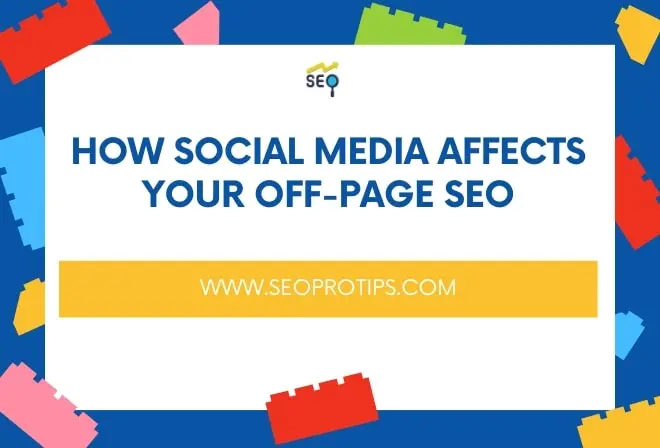Introduction
In today’s digital landscape, social media has become more than just a tool for connecting people—it’s a driving force behind search engine optimization (SEO) strategies. While most people associate SEO with on-page tactics like keyword optimization and meta descriptions, off-page SEO is equally essential. Social media plays a pivotal role in off-page SEO, helping businesses build authority, attract backlinks, and drive traffic. In this article, we’ll explore how social media can significantly influence your off-page SEO efforts and help you climb search engine rankings.
What is Off-Page SEO?
Off-page SEO refers to all the activities that take place outside your website to boost its search engine ranking. While on-page SEO focuses on optimizing elements within the website, off-page SEO is about building your site’s reputation and authority through external means.
Importance of Off-Page SEO
Why is off-page SEO so critical? It helps search engines understand how other websites and users perceive your website. A site that’s considered reputable and authoritative will naturally rank higher on search engine results pages (SERPs). Off-page SEO includes strategies such as link building, influencer marketing, and, of course, social media engagement.
Understanding Social Media’s Role in SEO
Social media and SEO may seem like separate entities, but they are interconnected in several ways. Social media doesn’t directly influence your site’s ranking on Google or Bing. However, it plays a crucial role in improving various off-page SEO factors, which contribute to your overall rankings.
How Social Media Signals Impact SEO
Social Sharing and Link Building
Every time your content is shared across social media platforms, it increases the chances of earning backlinks. High-quality backlinks are one of the most important off-page SEO signals. When users share your content, it has the potential to be seen by bloggers, journalists, or other website owners who may link to it, further improving your SEO.
The Influence of Engagement Metrics
Engagement on social media—likes, shares, comments—can indirectly impact your SEO by showing search engines that your content is valuable. Search engines like Google look at social engagement as a way to gauge the relevance and authority of your content, which can contribute to your ranking signals.
Building Brand Awareness with Social Media
A strong social media presence builds brand awareness, which is a key component of off-page SEO. The more people recognize and trust your brand, the more likely they are to engage with your content and link back to it. Brand awareness through social media also leads to more organic searches, another factor that can boost your rankings.
Social Media’s Impact on Domain Authority
Domain authority (DA) is a measure of how well a website is likely to rank on search engines. Social media can indirectly impact your domain authority by helping you attract quality backlinks, increasing traffic to your site, and boosting overall engagement. All these factors can contribute to a higher DA, helping your website rank better on SERPs.
Driving Traffic Through Social Media
The Correlation Between Traffic and Rankings
There’s a clear correlation between the amount of traffic a site receives and its search engine ranking. Social media platforms are excellent channels for driving traffic to your website. When you consistently share engaging content on social media, you encourage users to visit your site, increasing your traffic metrics and, in turn, improving your ranking potential.
Referral Traffic from Social Media
Social media platforms act as a significant source of referral traffic. When users click on your shared links, they’re directed to your website, contributing to your referral traffic metrics. This traffic is valuable for SEO, as it shows search engines that users find your content relevant and engaging.
How Social Media Helps With Backlinks
Social Media Profiles as Backlink Sources
One of the simplest ways social media aids in off-page SEO is by providing backlink opportunities through profiles. Your social media profiles, which link back to your website, serve as a source of backlinks. These may not be high-authority links, but they still contribute to your overall SEO.
Content Sharing and Earning Backlinks
When your content is shared and reshared across social media, it gains visibility. The more exposure your content has, the higher the chances of it being picked up by authoritative websites that might link back to it, providing valuable backlinks for your site.
The Indirect Benefits of Social Media on SEO
Boosting Brand Mentions
Social media helps amplify your brand mentions. Even if these mentions don’t come with direct backlinks, search engines consider them when determining the authority and relevance of your site. Brand mentions can serve as an indirect SEO signal, improving your off-page SEO efforts.
Influence of User-Generated Content
User-generated content (UGC) on social media, such as reviews, comments, and testimonials, can significantly influence your SEO. UGC acts as social proof and encourages others to engage with your brand, boosting its credibility and authority.
The Role of Social Media Platforms in SEO
With billions of active users, Facebook is a goldmine for SEO. Sharing content, engaging with followers, and driving traffic through Facebook can significantly impact your off-page SEO strategy.
Twitter/X
Twitter, now known as X, allows for quick and real-time content sharing. Trending topics, hashtags, and interactions on X can help spread your content quickly and attract attention from other websites, increasing your chances of earning backlinks.
LinkedIn is particularly useful for B2B businesses. Sharing content on LinkedIn helps establish your brand’s authority in your industry, leading to more backlinks and engagement from professional audiences.
Pinterest can be a valuable tool for visual content. By pinning and sharing high-quality images that link back to your website, you increase the chances of attracting backlinks and driving traffic, particularly if your content resonates with Pinterest’s user base.
Social Media and Local SEO
Social media platforms allow businesses to engage with local audiences. By using geo-tags, localized hashtags, and encouraging reviews, businesses can boost their local SEO efforts. Local engagement through social media also helps businesses appear more frequently in localized search results.
Social Media Influencers and Off-Page SEO
Influencers on social media platforms can dramatically impact your off-page SEO. Partnering with influencers allows your brand to reach a larger audience and can lead to valuable backlinks from influencers’ websites or blogs, helping to improve your SEO strategy.
Building Relationships Through Social Media for SEO Benefits
Networking with Industry Leaders
Social media is a great platform for networking with industry leaders and influencers. By building relationships through engagement and collaboration, you can gain valuable backlinks and mentions from authoritative sources, boosting your SEO.
Common Mistakes When Using Social Media for SEO
One of the most common mistakes businesses make is not optimizing their social media profiles for SEO. Ensure that your profiles include relevant keywords, links, and consistent branding. Another mistake is not engaging with your audience consistently, which can hinder your ability to drive traffic and earn backlinks.
Conclusion
Social media is an integral part of any off-page SEO strategy. It helps build backlinks, drive traffic, boost domain authority, and improve brand awareness. By using social media effectively, you can significantly enhance your site’s overall SEO performance.
FAQs
- How important is social media in Off-Page SEO?
Social media plays a crucial role in building backlinks, driving traffic, and improving engagement, all of which are essential for off-page SEO. - Which social media platform is best for SEO?
While all platforms contribute to SEO, LinkedIn, Facebook, and Twitter/X are particularly effective for driving traffic and building authority.

